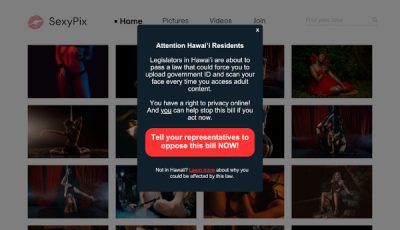Should the Adult Industry Voluntarily Adopt Age Verification? Has It Already?
 Going back as far as the late ’90s, there have been those within the online adult entertainment industry who have argued in favor the industry taking sweeping actions to make it more difficult for minors to access adult websites.
Going back as far as the late ’90s, there have been those within the online adult entertainment industry who have argued in favor the industry taking sweeping actions to make it more difficult for minors to access adult websites.
Long before ICM Registry began the process to become the administrators of the .XXX sTLD, the idea of hosting of sexually-explicit sites on an adult-specific TLD was bandied about by various industry stakeholders, including the infamous Seth Warshavsky. Warshavsky floated the idea of an adult-specific TLD, .ADULT, during testimony before the U.S. Senate Committee on Commerce, Science and Transportation in 1998.
While mandatory age verification is looming in the United Kingdom, the likelihood of such a government-imposed system being established in the U.S. is considered very small by First Amendment experts. But is there an argument for the U.S.-based sector of the online adult entertainment industry voluntarily adopting a system along the lines of the one pending in the UK?
Tags and Filtering: A Less Burdensome Approach Already in Place
As noted by Jeffrey Douglas, the Board Chair of the Free Speech Coalition and Chair Emeritus of the First Amendment Lawyers Association, much of the American adult industry already has adopted a voluntary age verification measure, in the form of the widespread Restricted to Adults (“RTA”) website label.
“The industry has long supported voluntary age-verification programs and software and has worked with programs like RTA to help them identify adult sites, and block them with filters,” Douglas said. “Look at almost any legal adult site, and you’ll see RTA. That keeps us from being accessed when there’s a filter.”
At the same time, Douglas said, the adult industry has “always maintained that decisions to block adult material need to be made by the parent or consumer, rather than the government.”
“Many in adult entertainment have kids and have no more interest in having them access adult material than any parent outside the industry,” Douglas added. “But unlike a lot of politicians, we know that the best way to do this is by keeping the industry and its content above ground and legal. It’s by having parents take an active role in their kid’s online habits, and monitoring and installing filters if necessary.”
Although it typically goes unsaid and unnoticed, Douglas also observed that the adult industry does more to keep explicit materials out of the view of kids than do a lot of mainstream sites and platforms – particularly those which feature exclusively user-uploaded content.
“Contrast (the use of RTA) to the ‘new tech’ sites like Tumblr,” Douglas said. “There is enormous amount of user uploaded adult material on sites like that, but those sites have no connection to the adult industry culture. They seem to exhibit little sensitivity to the issue of access by minors.”
When it comes to the notion of embracing age verification systems which go beyond the use of labels and filters, Douglas said while there’s “not a downside, per se” to the idea, he did express reservations because “the mechanisms for doing it accurately are unclear.”
“We don’t want to keep records of someone’s personal ID, or unnecessarily require them to give us a credit card if they’re not purchasing,” Douglas said.
Beyond the data security implications of storing personally identifying information on site visitors, Douglas pinpointed several other concerns adult companies might have about establishing age verification measures like those anticipated in the UK.
“Most companies probably would profit by having adult content restricted to paying customers, but piracy upends that,” Douglas said. “Competition from companies located outside the US also upends that. And I think most of us are very hesitant to put those decisions for what is or isn’t adult content in the hands of a government regulator.”
Voluntary vs. “Voluntary”
While the U.S. Congress and state legislatures around the country are unlikely to be able to come up with a law mandating online verification for adult sites without running afoul of the First Amendment, attorney Larry Walters observed that private sector policies could have the same effect without the establishment of any new law.
“Ultimately, adult website operators may be forced to implement ‘voluntary’ age verification measures due to worldwide political pressure and codification of industry standards by financial service providers,” Walters said. “If banks and credit card processors require age verification to qualify for services, operators will have little choice but to comply, even if a US law is never passed.”
Douglas is concerned about the same possibility – and noted that with the extent to which private entities already engage in discrimination against and censorship of adult materials, the last thing the adult industry needs is the authority to do the same handed over to government entities.
“We already see how heavy handed and capricious censorship is at the corporate level — on social media or advertising platforms,” Douglas said. “That’s not the type of power we want to give the government, especially one with such a dim view of sex and sexuality.”














